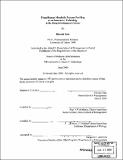| dc.contributor.advisor | Stan N. Finkelstein and Anthony J. Sinskey. | en_US |
| dc.contributor.author | Sato, Hiroaki, 1962- | en_US |
| dc.contributor.other | Sloan School of Management. | en_US |
| dc.date.accessioned | 2005-08-22T23:30:38Z | |
| dc.date.available | 2005-08-22T23:30:38Z | |
| dc.date.copyright | 2000 | en_US |
| dc.date.issued | 2000 | en_US |
| dc.identifier.uri | http://hdl.handle.net/1721.1/9205 | |
| dc.description | Thesis (M.B.A.)--Massachusetts Institute of Technology, Sloan School of Management, 2000. | en_US |
| dc.description | Also available online at the DSpace at MIT website. | en_US |
| dc.description | Includes bibliographical references (leaves 47-50). | en_US |
| dc.description.abstract | Undesirable pharmacokinetic properties, such as poor bioavailability and drug-drug interactions, have been one of major reasons for the failure of new pharmaceuticals in clinical trials. These dropout risks can be reduced by early knowledge of human pharmacokinetics in the drug discovery process. Although new drug candidates have been first tested in animal-based systems, the prediction of human pharmacokinetics from animal data has been unsuccessful due to species differences in the enzymes involved in drug metabolism. Recent progress in molecular biology made it possible to develop in vitro drug metabolism systems using human metabolic enzymes, such as purified microsomes or expressed cytochrome P450. These systems are useful in profiling the enzymes involved in the human metabolism and extrapolating the in vitro findings to in vivo situations. The in vitro systems may yield a rapid drug metabolism screening of numerous compounds generated through combinatorial chemistry and high-throughput pharmacological screening. The integration of these technologies into the drug development process will significantly reduce the dropout risks in clinical trials and shorten the period between the drug discovery and market introduction. | en_US |
| dc.description.statementofresponsibility | by Hiroaki Sato. | en_US |
| dc.format.extent | 60 leaves | en_US |
| dc.format.extent | 5095922 bytes | |
| dc.format.extent | 5095677 bytes | |
| dc.format.mimetype | application/pdf | |
| dc.format.mimetype | application/pdf | |
| dc.language.iso | eng | en_US |
| dc.publisher | Massachusetts Institute of Technology | en_US |
| dc.rights | M.I.T. theses are protected by copyright. They may be viewed from this source for any purpose, but reproduction or distribution in any format is prohibited without written permission. See provided URL for inquiries about permission. | en_US |
| dc.rights.uri | http://dspace.mit.edu/handle/1721.1/7582 | |
| dc.subject | Sloan School of Management. | en_US |
| dc.title | Using human metabolic enzyme profiling as an innovative technology in the drug development process | en_US |
| dc.type | Thesis | en_US |
| dc.description.degree | M.B.A. | en_US |
| dc.contributor.department | Sloan School of Management | |
| dc.identifier.oclc | 45483588 | en_US |
